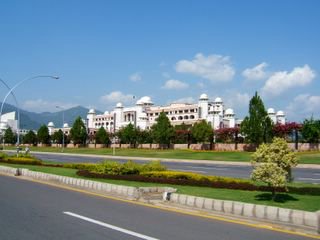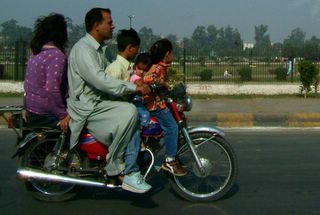4:30 (AM) - Wake up. Thank you, jet lag!
5:00 - Work out – one of this month’s aspirations is to return to my old workout habits, and I’ve got nothing better to do at 5 AM.
7:00 - Wash under-things in hotel sink.
7:20 - Discover only brought two pairs of socks to Lahore, both of which are residing in sink.
7:25 - Call colleague and ask to borrow hair dryer to dry socks, or socks.
8:00 - Leave for appointment at microfinance institution (MFI) wearing NY Subway ankle socks.
8:30 - Lost in Lahore. Drive around aimlessly in smog that hangs like a morning mist over the city.
9:00 - Arrive late at meeting. MFI director tells us that she and her company already know everything we’ve been brought in to research. Wonder why I am here.
9:30 - Meet with marketing department which confirms they already know everything we’ve been asked to do. Feel I’ve been set-up to fail.
10:00 - Drive to branch office, in “suburb” of Lahore. Sort through the data they already have – it’s true, they’ve got pretty much everything they need.
12:00 - Get loaded into back of motorized rickshaw by MFI staff, who take us to visit some nearby clients. Children point and laugh at the sight. Swear never to do this again.
12:30 - Trek past water buffalo and down narrow, muddy, brick roads strewn with garbage. Think this is the best job in the world.
1:00 - Interview clients, two brothers who sell tents, overseen by five employees of MFI who interrupt and intimidate clients. Older brother contradicts younger brother. Younger brother pouts.
1:30 – Another client visit, this time to a family that butchers cows. Pieces of fatty animal flesh cling to the soot-darkened walls of their home's courtyard. Flies buzz aggressively, attracted by the odor. All my vegetarian instincts revolt.
1:45 – Interview a client who sells appliances. Small children press their faces against the window, making faces. I make faces back. They laugh hysterically. At least I've entertained some kids today.
2:00 – Interview a family that makes pickled garlic and ginger. The air is redolent with the odor, as will I be shortly. Circles of dung, each with a single perfect handprint, line a brick wall outside. Curse myself for having forgotten camera. Would have made excellent photo for nephew’s school report on alternative fuel sources. Return to branch office.
3:30 - Flee the scene, refuse offer of lunch back at MFI HQ. Wretched old woman grasps my arm, begging for money. I move to give it to her and am tackled by my Pakistani colleagues, who tell me if I do they’ll never be able to walk this street in peace again. Hang head in shame. Beggar, denied, curses my colleagues.
4:00 - Lunch. Scrub mysterious brown muck from palm of hand (prior to eating). Eyes burn from pollution.
5:00 - Go shopping with colleague, whose sister is about to be married and requires multiple thousand-dollar outfits for the many wedding events.
7:00 – Discover secret of Pakistani fashion sense. Had known that when women purchase clothes, the outfit is sold complete, hence fabulous coordination. Had known most women have their clothes made, however, and wondered how they managed to match the fabrics so perfectly. See fabric also sold in coordinated sets of three (shawl, top, and pants), sewn loosely together like one giant banner. Buy opulently beaded and embroidered shawls instead. Must buy little black dress when get home.
8:30 – Dinner on the rooftop of Cooco’s Den, overlooking the spectacularly lit old fort and mosque. Debate the meaning of the red lights on the buildings around us. Agree that we will look like jerks if we continue with the proposed work. Get approval from boss in Islamabad to renegotiate work agreement.
10:00 - Bed
11:00 – Earplugs prove no match for the buzz and clatter of construction on the floor above. Call management. Fall asleep feeling vindicated.


